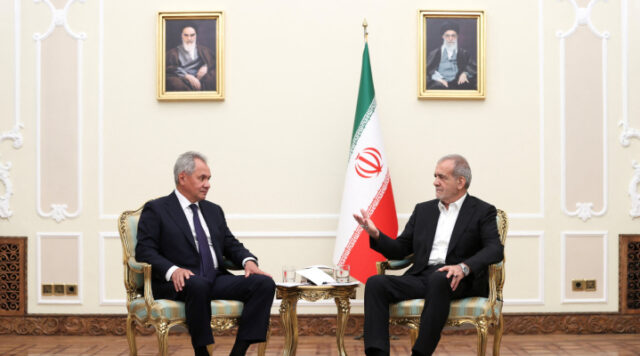
According to Sergei Lavrov, Russia’s Foreign Minister, Russia is close to signing a comprehensive treaty with Iran that will include defense cooperation. At the moment, there is no text of the agreement nor any detailed description of its actual contents.
Yet hidden behind the Russia-Iran deal is a bid by Russia to become the “peace broker” in the Middle East.
This would enhance Russia regionally and beyond, and would diminish the American position considerably. It is part and parcel of Russian President Vladimir Putin’s goal of attaining international credibility and acceptance two years after the start of Russia’s so-called “Special Military Operation” in Ukraine.
For decades, Russia has been trying to gain influence in Iran, including seeking bases in that country. While Iran has been willing to buy Russian military equipment, or to barter for it — and willing to sell drones and missiles to Russia for use in Ukraine — it has been unwilling to grant any bases. Iran appears to be sticking to that policy now, as there is no hint that Russia will get a military presence on Iranian territory.
Nor is there any suggestion that Russia would come to Iran’s aid if there was an attack on Iranian territory, provoked or unprovoked. In short, Russia is under no obligation to help Iran in case of war.
So, what is Russia hoping to achieve?
While Moscow surely wants to expand its influence in Iran, it also has important relations in the Persian Gulf that it not only wants to protect, but also expand. Major oil producers the United Arab Emirates (UAE) and Saudi Arabia are on this list.
The mechanism the Russians — and Chinese — are using to build relations with Iran, Saudi Arabia, and the UAE is BRICS (an acronym for Brazil, Russia, India, China, and — later — South Africa), a group formed in 2001 of then-emerging economies.
Described as an “informal relationship,” it is focused mainly on economic and financial issues. Seeing an opportunity for expanded political as well as economic influence, in December 2023, the BRICS members invited a number of countries to join. Argentina declined after Javier Milei was elected president. Iran, the UAE, Ethiopia, and Egypt accepted — the last three being long-time US allies and commercial and military partners. Saudi Arabia was invited, but “delayed” a response. Under apparent pressure by the United States, the Saudis have neither confirmed nor denied their intentions.
For the recent BRICS meeting in Kazan, Russia, 38 countries were invited and 32 participated. A surprise participant was UN Secretary-General Antonio Guterres, which was seen as controversial, since the International Criminal Court (ICC) has issued an arrest warrant for Vladimir Putin, who hosted the meeting. Saudi Arabia’s foreign minister attended as an “observer.”
BRICS is moving toward establishing an alternative banking and currency system to the US-led currency system, known as Bretton Woods, which includes the SWIFT financial transaction processing system. In 2022, as a result of Russia’s invasion of Ukraine, the US and EU imposed sanctions on a number of Russian banks, which were removed from the SWIFT system.
Meanwhile Turkey, a NATO member, has asked to join BRICS, and Turkish president Recep Tayyip Erdoğan attended the summit. Turkey has been furious with Europe, as the EU has consistently blocked Turkey from EU membership, based on human rights violations, rule of law, and other complaints. As Ankara increasingly turned eastward, Russia sold Turkey sensitive military equipment including the S-400 air defense system, and would like to sell more in future, especially fifth generation jet fighters.
With regard to Iran, the Russian strategy is to try and bring Iran into a “normal” relationship with the BRICS partners, while preserving and expanding Russian ties to traditional US friends in the Middle East and Europe. From Russia’s point of view, the BRICS partnership also offsets and undermines European and American sanctions leveled on Russia since the start of the Ukraine war.
But Russia may have other ambitions, hinted at by Putin himself.
Russia is quietly working at positioning itself as a “peace broker” between Iran and Israel. Despite its support for Iran and its presence in Syria, the Russians have consistently honored a deconfliction arrangement with Israel. This has meant Israel has had a free hand to knock out Syrian, Hezbollah, and Iranian assets in Syria without a Russian military response. Russia now wants to capitalize on its positive relations with both Israel and Iran, and Putin is quietly trying to push the Iranians to secretly seek some accommodation with Israel.
It may seem odd, as Russia has been an outspoken critic of Israel since 10/7 and never has been helpful in the UN or other institutions, but Russian policy is not about Israel or Iran, it is about Russia. And Putin. Netanyahu met with Putin and Zelensky in hopes of mediating the Ukraine war; Prime Minister Bennett did as well, making a surprise visit to Moscow during his short tenure. Even now, reports indicate that Israel seeks Russian participation in the Israel-Lebanon negotiations as a means of ensuring Iranian cooperation.
If Putin is successful, the Middle East and the world more broadly, would look considerably different — to the detriment of American interests, influence, and alliances.

